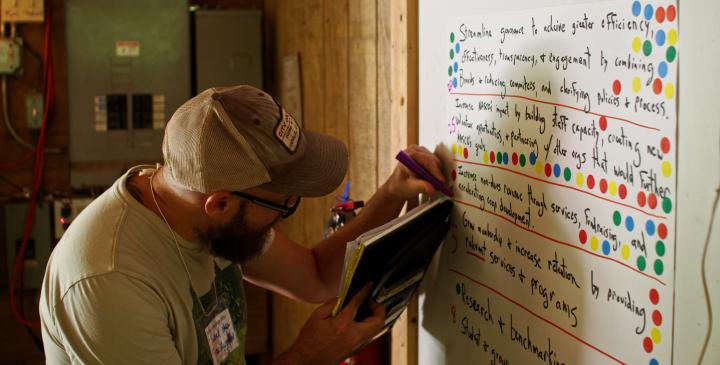Learning opportunities for all co-op members.
We are committed to Cooperative Principle #5 – Education, Training, and Information. From online webinars to on-site workshops, regional conferences, and our annual conference, we are here to provide ongoing learning opportunities for you and your co-op Check out some of our core training topics below.
Pricing
| NASCO members | $200 USD per training* (beyond the 3 trainings included in NASCO membership) |
| Non-members | $500 USD per training* |
*Training rates listed refer to the core training topics included below without customization. Each training topic ranges from 1.5-2.5 hours with Q&A time. For customized trainings or topics not included below, we will work with you to determine a custom rate based on our consulting rates.
We also offer training materials and webinar recordings in our free resource library.
Not seeing what you need? Contact us with your needs and we will do our best to assist you.
Co-ops 101
It is never a bad time to review the basics. In this training, we cover the different types of co-ops, the principles of cooperation, and how your co-op fits into the bigger picture.
Board Roles and Responsibilities
This essential workshop is for co-op boards for all shapes and sizes. Board members attending this workshop will learn about their duties, functions, and legal responsibilities to their cooperative organization.
For more seasoned board or board members, we also offer a "Beyond the Basics" Board Roles workshop which includes defining the scope of your board, governance styles, board practices for sustainability, and discussion scenarios.
Budget Fluency
Budgets aren't just a spreadsheet, they're a way that your co-op can tell its story and a tool to help members understand how the organization works. This workshop is meant for any co-op member, not just for Treasurers!
Meeting Facilitation
Meetings should be a high point in your co-op life, but sometimes difficult issues or an unclear meeting process can get in the way. This workshop will focus on how to make meetings fun and productive with recommendations for your process within meetings as well as best practices for delegating work, building consensus, and getting unstuck.
For more seasoned co-opers, we offer a "Beyond the Basics" Meeting Facilitation workshop which includes de-escalation tools, facilitating online meetings, and interactive scenarios for participants to practice facilitation tools.
Building Community Agreements
We will help you create an open and respectful environment in which members can work together creatively and individuals feel safe, sharing their ideas and opinions.
Financial Recordkeeping
Financial records go beyond checkbooks or spreadsheets. This workshop gives your members and officers a clear understanding of what records are relevant for your co-op, and how these records can be used to improve your group's decisions or make life better for members.
Co-op Member Roles & Responsibilities
This workshop reviews cooperative members' responsibilities to each other, future members, and the co-op as a whole. We will provide tools to describe and promote member roles and responsibilities in your co-op.
Quickbooks 101
Quickbooks is a common tool for co-op treasurers but can be confusing start with. This training will cover the most common tasks your finance officers will need to keep books that are well-organized and easy to understand.
The Fair Housing Act and Your Co-op
Your co-op's role as a provider of housing comes with a responsibility to offer that housing without illegal discrimination. This workshop will cover the Fair Housing Act's protections against discrimination, including what counts as discrimination, and who is protected from various forms of discrimination. The workshop includes policy recommendations to avoid problems. This workshop is focused on the US Fair Housing Act but overlaps with the Canadian requirements as well.
Co-op Labor Systems
As cooperators we don't just contribute our rent dollars–we also contribute our energy, our ideas, and our time to make our co-ops better. This training will help your members find the labor system that's the best fit for their needs, offer tools for accountability, and make sure that your labor system is accessible to all members.
Maintenance Planning
When will your roof need to be replaced? How do you know if you have a foundation problem? How is your co-op going to pay for big projects when they come up? This workshop will explore the intersection of maintenance, finance, and the member experience in co-ops. Participants will take away tips to spot serious issues, to plan ahead for predictable problems, and to track whether or not you're financially prepared in the long run.
Membershipping
One of the most important tasks for any cooperative is to find new members to keep your community running for the future. Membership decisions are also sensitive, personal, and important for creating a co-op culture that's safe, welcoming, and inclusive. This training will focus on what works for other co-ops in attracting and retaining members, what to watch out for in designing a membership approval process, and how to deal with the complicated issues before they come up.
Kitchen and Meal Management
Sharing means can be one of the most rewarding or frustrating parts of the cooperative experience. This workshop will focus on the logistics and labor questions your co-op will face to provide meals to members while keeping kitchens clean.
Board and Staff Evaluation
We recommend at least one evaluation per term for board and staff members. Does your co-op have a system in place for evaluating those in leadership positions? In this workshop, we will go over evaluation templates and best practices for your co-op.
Co-op Conflict Support
Whether your co-op is just starting to develop guidelines for approaching conflict or has already established protocol, this workshop will support your members to unlearn harmful approaches and build an adaptable and transparent conflict support toolbox. We'll discuss the limits of conflict resolution, review proactive processes and tools for navigating conflict, and provide additional resources.

